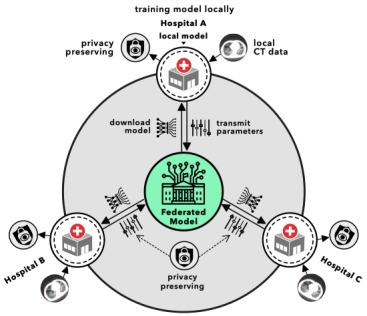On December 15th, Nature Machine Intelligence published a research study entitled Advancing COVID-19 diagnosis with privacy-preserving collaboration in artificial intelligence. The research was led by the School of Artificial Intelligence and Automation of HUST, and was jointly developed by the University of Cambridge, Stanford University, Johns Hopkins University, MD Anderson Cancer Hospital, Tongji Hospital of Tongji Medical College, Union Hospital affiliated with Tongji Medical College, National Center for Drug Screening and other prestigious research institutions around the world.
Artificial intelligence has been revolutionizing medicine. However, the current artificial intelligence models normally lack the ability to generalize. Their performance on training data is excellent but becomes unstable when it comes to new data which is never seen by the models. This fundamental flaw has limited AI’s potential in medical research and applications, raising increasing concerns over security. Unfortunately, collecting enough medical data for building an effective AI model is always extremely challenging due to issues about patient privacy, intellectual property rights and data complex, making it impossible to build a large-scale comprehensive medical data integration. As a result, medical artificial intelligence models can only be trained on limited or even single data sets. These AI models clearly can and should only be applied in very specific and limited circumstances.
To develop a medical AI model with comprehensive applications like we have in face recognition, the team of Professor Xia Tian and Professor Bai Xiang at the School of Artificial Intelligence and Automation of HUST proposed a Unified CT AI Diagnostic Initiative (UCADI) based on federated learning technology. In ensuring data security and privacy, UCADI can share training medical data at different geographical locations without data transferring, creating a highly generalized medical AI model. Based on UCADI, the team of Professor Xia Tian and Professor Bai Xiang made joint efforts with Tongji Hospital and Union Hospital affiliated with Tongji Medical College, Wuhan Tianyou Hospital, Wuhan Central Hospital, Wuhan Children's Hospital, National Drug Screening Center, and the Cambridge Medical Center (maintaining EU-wide Covid imaging data, covering 23 hospitals across the UK), to launch the collaborative research initiative for an AI model that can share international imaging data of coronavirus cases, enabling the worldwide development and training of medical AI models to further assist Covid diagnosis.

Based on a data sample of nearly 10,000 chest imaging scans from 23 hospitals in China and Britain, the research team verified that UCADI could quickly and efficiently help train and develop the AI-aided diagnostic models and achieve cross-border multi-centre intelligent Covid diagnosis alongside protecting the privacy of user data. Compared with the model trained on the data from a single hospital, the UCADI-trained AI model not only demonstrated a far superior performance in the diagnosis of Covid, but it also showed good generalization and robustness on the effective data set of multiple different hospitals.
The team further analyzed the interpretability and uncertainty of the trained AI model and confirmed that the model could capture the unique features in the chest CTs of new coronavirus carriers such as ground-glass opacity and interlobular septal thickening. Regarding the differences in imaging data from hospitals in various countries, the team chose 3DDenseNet as the basic framework for UCADI, as it not only demonstrated good generalization ability but also had a rather small size which is convenient for transmission in federated learning framework. Moreover, the team applied CycleGAN to transform the contrast CTs into augmentations, thus expanding the effective data set and improving the model's predictive performance.
In this work, UCADI has demonstrated its value in the fight against the global pandemic. The Covid diagnostic model trained on global data is completely free to everyone who needs it all over the world. Medical institutions worldwide can use UCADI to further share, update, evolve and optimize the model. For example, Cambridge University and the new World Health Organization (WHO) Hub for Pandemic and Epidemic Intelligence, established in Germany October 2021, have cooperated to develop the model's capability to identify Omicron, the new Covid variant. At the same time, UCADI is completely open-source and can be used for other types of medical data. It ensures data security and creates an opportunity for medical data to realize their true values and make effective contributions to global medical development. Furthermore, UCADI provides an infrastructure for the future cross-border research and development of intelligent diagnostic systems, laying the foundation for a medical AI model that can be used widely.
Article link:https://www.nature.com/articles/s42256-021-00421-z
Source: School of Artificial Intelligence and Automation
Written by: Tian Xinyu, Lai Xiangyu, Xia Tian
Edited by: Andrew, Peng Yumeng
